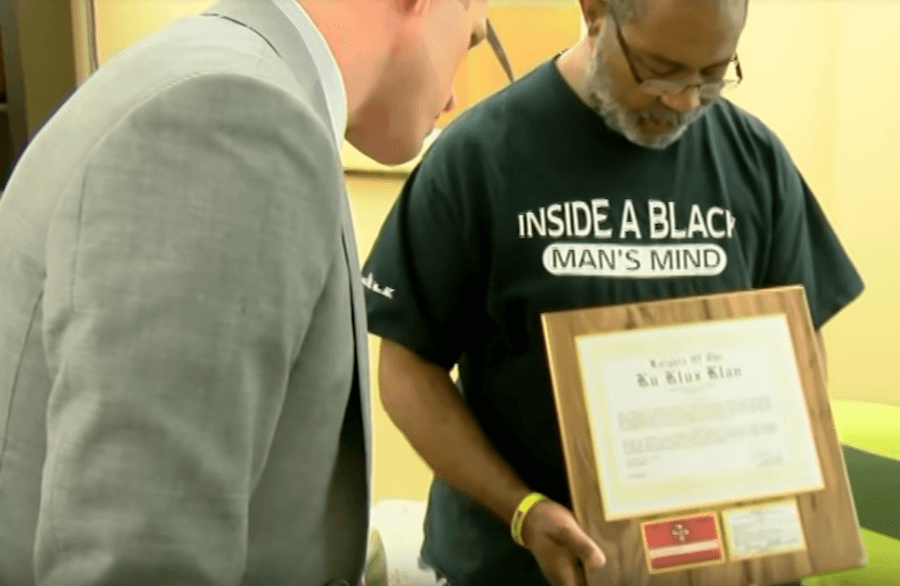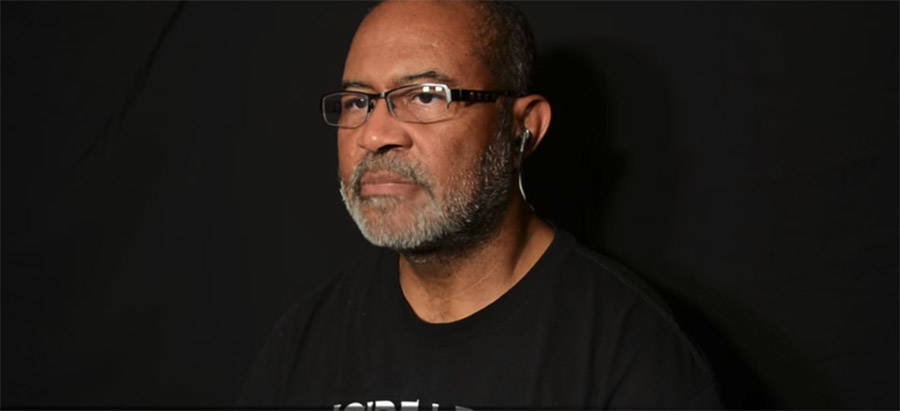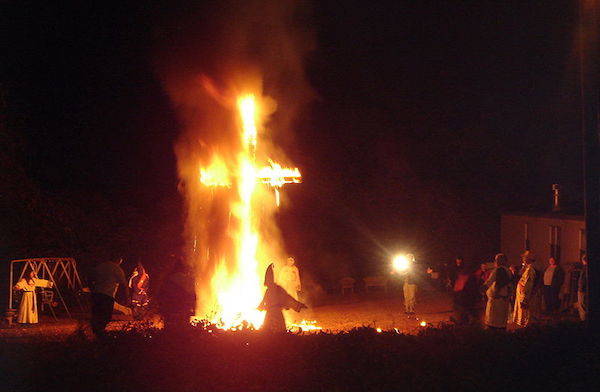Ron Stallworth was the first black cadet to join his police division in the 1970s. He's also the first black man to hold a membership card from the KKK.

YouTubeRon Stallworth showing his KKK membership card.
During one of their peaks in power, the Ku Klux Klan unknowingly let a black man into their organization. Ron Stallworth, a Colorado police officer, didn’t realize it would be so easy to trick the group that so hated him. Maintaining his cover, though — that would take work.
Ron Stallworth Gets Into Law Enforcemnt
Ever since the Ku Klux Klan formed in 1865, the white supremacy group’s level of power has gone through waves. As a reaction to the Civil Rights Movement of the 1960s, the KKK in the 1970s had a strong following. They murdered civil rights workers and planted firebombs on school buses. There was the Greensboro massacre, where five protesters were killed by KKK members in North Carolina.
And then there was Ron Stallworth.
It was the summer of 1972 when 19-year-old Ron Stallworth moved from El Paso, Texas to Colorado Springs, Colorado. As he was already interested in a law enforcement career, he enrolled in a cadet program designed to bring more minorities into the department. He ended up being the first black cadet in the program

YouTubeRon Stallworth today.
The department didn’t meet him with open arms. His interview panel told him that he’d be challenged, that the environment would be hostile, and essentially said he’d be the “Jackie Robinson” of the department.
But Ron Stallworth completed the cadet program and became the department’s youngest and first black detective at 22. He wasn’t into the uniforms though and even as a cadet, he knew he wanted to do undercover work.
“When I first saw the narcotics officers walking around—these guys with long beards and long hair looking like San Francisco hippies—I liked the fact that these guys were actually cops wearing guns, carrying badges. I thought that was the neatest thing, to look like that and be a police officer,” he said.
Whenever Stallworth saw the sergeant in charge of narcotics he’d say, “Hey, Art, make me a narc!”
He got his first shot at undercover work when Stokely Carmichael, the Black Panther activist, came to town to give a speech. Stallworth was asked to listen in and report anything interesting. “It was my first brush with living black history,” said Stallworth, who described Carmichael as a “fiery, bombastic speaker.”
Joining The Ku Klux Klan
Stallworth was assigned to the department’s intelligence section, dealing with things like organized crime and criminal intelligence. Part of the job was to browse through newspapers, looking for anything worth investigating. Flipping through the paper one day in 1978, he saw a classified ad for the Ku Klux Klan with a PO box.
Unsure of how serious the ad was, Ron Stallworth decided to write a letter under the guise of a white man. Peppering the letter with racial slurs, he said that he wanted to take back the country. One mistake he made: signing his real name.
It wound up not making a difference. He received a call about a week later. It was the KKK’s local organizer. Using the same rhetoric he used in the letter to explain why he wanted to join, the organizer decided Stallworth was just what they needed. He was in.
There was one crucial problem. The real Ron Stallworth couldn’t show up to meetings. So he recruited a fellow officer, Chuck, to act as “the white Ron Stallworth.”
Stallworth talked to the KKK members over the phone, while Chuck attended the in-person meetings. That meant anything Stallworth said in a phone conversation, Chuck would have to know about and pretend it was him on the phone. And after Chuck attended a face-to-face meeting, Stallworth had to pretend on the phone the next day that he was the one there.
Over the course of the investigation, which lasted seven months, suspicion arose just one time. After Chuck had been to a meeting, Stallworth called the local organizer who asked why his voice sounded different. Stallworth chalked it up to a sinus infection, to which the KKK member said, “Oh, I get those all the time. Here’s what you need to do…”
But something more serious was about to really put his cover in jeopardy. David Duke, the Grand Wizard of the Ku Klux Klan, was coming to Colorado Springs to give a few publicity interviews. And Ron Stallworth was assigned to be Duke’s bodyguard.
At that point, Stallworth had been periodically speaking to David Duke over the phone.
He argued that being in that close contact with Duke could jeopardize the case and that his voice could be recognized. But the chief told him he was the only one in the intelligence division available.

Wikimedia CommonsDavid Duke in 1978.
While assigned as his bodyguard, the real Stallworth told Duke that he didn’t believe in his ideologies, but was a professional and would keep him safe. “He thanked me very cordially, very graciously — he shook my hand.” David Duke clearly didn’t know that he had spoken to the man whose hand he was shaking many times. And when he gave Stallworth the Klan handshake, he didn’t know that Stallworth recognized that’s what it was.
Duke even agreed to take a picture, but when Stallworth put his arm around him for the photo, Duke tried to snatch the camera away.
Stallworth told Duke if he touched him, he’d be arrested for assaulting a police officer. Reflecting on racists like Duke that black people had to tolerate throughout generations, Stallworth could only think, “On this particular occasion, I had the power, I was the authority and the Klan was at my mercy.”
The End Of An Investigation
David Duke didn’t uncover Stallworth’s identity, but the investigation ended for a different reason. The local Ku Klux Klan asked Stallworth to be their new organizer. They thought he’d be good for the job since he had proven to be “a loyal and dedicated Klansman.”
Stallworth was ready to accept, but the chief panicked. He asked for the investigation to be shut down, told Stallworth to stop answering calls, change the undercover phone line number, and destroy all reports.
Over the course of the operation, it’s believed that Stallworth stopped at least three cross burnings from happening by secretly increasing security when he was invited to one.
It was also revealed through the investigation that there were Klan members in the military and two of them controlled triggers for nuclear weapons. They were subsequently reassigned.

Wikimedia CommonsAn Example Of A KKK cross burning.
Stallworth did as he was told though, and shut down the investigation. But he didn’t destroy all the reports. Instead, he took all the notebooks, drove home with them, and has kept them ever since.
Another “souvenir” he kept: His KKK membership card, signed by David Duke.
Ron Stallworth continued to work as an investigator for 20 years. He retired in 2005 but remained active as the chairman of the Black Advisory Council as well as with the Parks Department.
As for the Colorado Springs police department of which he was the only black cadet in 1978, Stallworth said in 2014, “I can tell you right now that the manager in that department is black, and a friend of mine. There’s also a female lieutenant among 43 total officers who are black.”
But he also knows that the KKK is still alive in America, and it still goes through waves of power. “We should always be vigilant of that fact and be mindful of it and ready to combat it in whatever form it exists in.”
A Spike Lee film titled BlacKkKlansman about Ron Stallworth’s story was released in August 2018 and was nominated for Best Picture by the Academy Awards.
After learning about Ron Stallworth’s incredible undercover work in the KKK, read how Daryl Davis, a black man, convinced 200 racists to leave the KKK. Then look at these disturbing photos that show what it’s like to grow up in the KKK.





